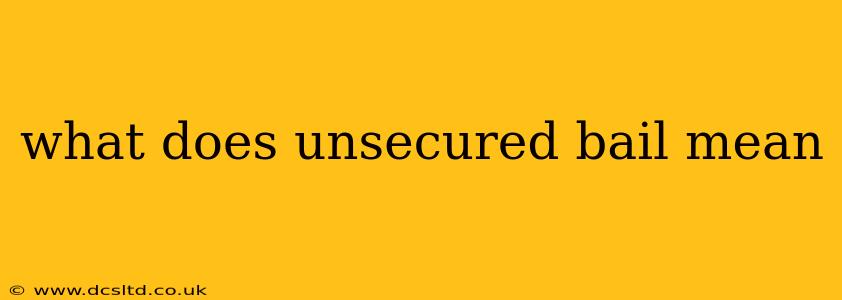Bail is a crucial aspect of the American legal system, offering a pathway to freedom while awaiting trial. However, the various types of bail can be confusing. This article clarifies what unsecured bail means, comparing it to other bail options and outlining its implications.
Unsecured bail essentially means you're released from custody without having to pay any money upfront. Unlike secured bail (where you post a bond or cash), there's no financial collateral guaranteeing your return to court. The "security" for your release is your promise to appear. If you fail to show up for your court dates, you could face penalties, including the issuance of a warrant for your arrest and potential forfeiture of any assets.
What Happens if You Don't Appear in Court After Unsecured Bail?
This is the critical consequence of unsecured bail. Failure to appear (FTA) can lead to several serious repercussions:
- Warrant for your arrest: A judge will issue a warrant, and law enforcement will actively pursue you.
- Increased bail: If you're eventually apprehended, the court may set a much higher bail amount than the original unsecured bail.
- Charges for FTA: You could face additional charges specifically for failing to appear in court. This could lead to significant fines and even jail time.
- Damage to your reputation: A FTA can severely impact your ability to obtain future employment, housing, or even travel.
What is the Difference Between Unsecured Bail and Other Types of Bail?
Several types of bail exist, each with different requirements and consequences:
-
Secured Bail (Cash or Bond): You or a bondsman post a specific amount of money or a bond to guarantee your appearance. If you appear, you get your money back (or the bond is released). If you don't, the court keeps the money.
-
Surety Bond: This involves a third party (often a bail bondsman) paying the bail on your behalf. You may pay a fee to the bondsman, but they're responsible for ensuring your court appearance.
-
Conditional Bail: This involves stipulations attached to your release, such as attending regular drug testing, curfews, or attending rehabilitation programs. Failure to comply results in potential revocation of bail.
-
Release on Recognizance (ROR): This is similar to unsecured bail but usually given in less serious cases, reflecting a judge's belief in the defendant's high likelihood of appearance.
Who is Eligible for Unsecured Bail?
Eligibility for unsecured bail depends heavily on the specifics of your case and your history. Factors considered include:
- Severity of the charges: Minor offenses are more likely to result in unsecured bail than serious felonies.
- Criminal history: Individuals with clean records are more likely to be granted unsecured bail than those with prior convictions or a history of FTA.
- Ties to the community: Strong community ties (family, job, residence) demonstrate a higher likelihood of court appearance.
- Flight risk: The judge assesses your risk of fleeing the jurisdiction.
How is Unsecured Bail Determined?
The decision to grant unsecured bail rests solely with the judge. During your initial appearance or arraignment, the judge will review your case and determine the appropriate type of release, considering the factors listed above. They will weigh the risk of you fleeing against the presumption of innocence.
How Can I Prepare for a Bail Hearing?
If you're facing a bail hearing, it's crucial to:
- Gather supporting documents: This might include proof of employment, residency, family ties, and any evidence supporting your low flight risk.
- Seek legal counsel: An attorney can effectively advocate for your release on the most favorable bail terms possible.
- Be prepared to answer questions honestly: Cooperating with the court will positively impact the judge's decision.
Understanding the nuances of unsecured bail is vital for anyone navigating the legal system. While it offers a path to freedom without upfront financial commitment, the responsibility for court appearance remains paramount. Failure to appear has serious consequences. Consulting with a legal professional is highly recommended to navigate this complex process.
